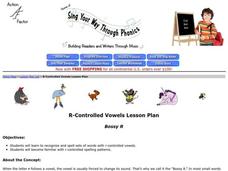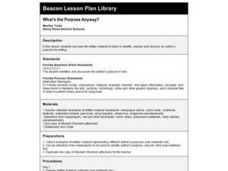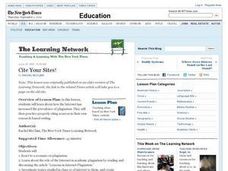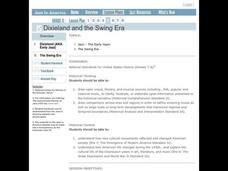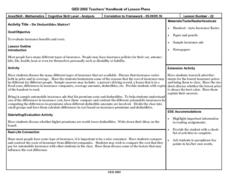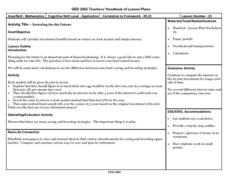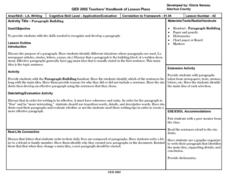Curated OER
Create a 60s Mural
Middle schoolers conduct Internet research on the 1960s and use what they have learned to create a mural.
Curated OER
Preparing a Business Plan to "Be Your Own Boss"
Do your scholars strive to work for themselves some day? Help young entrepreneurs create a business plan for an original idea and present it to a "board of directors." They complete online research (some links provided) and put...
Curated OER
Pizza Possibilities
Learners create and interpret line plots, bar graphs, and circle graphs. The lesson assumes mastery of conversions from fraction to decimal to percent, construction of angles, and at least an introduction to graphs displaying data.
Curated OER
How Does Advertising Affect You?
Students understand what advertisements are trying to do and how they do it
Curated OER
Sing Your Way Through Phonics Lesson Plan
Students recognize and spell sets of words with r-controlled vowels. They become familiar with r-controlled spelling patterns.
Curated OER
What's the Purpose Anyway?
Examine author's purpose in newspaper articles, comic books, cookbooks, encyclopedias and other forms of written materials. Working in groups, middle and high schoolers read teacher-selected articles and write an explanation of the...
Curated OER
Plot the Oysters' Peril!
Use comic strips to teach sequencing in narrative poetry. As homework, each class member selects a comic strip with 4-8 frames, cuts the frames apart, places the pieces in an envelope, and brings the envelope to class. Class members swap...
Curated OER
Environmentally Friendly
What can your pupils do to promote better conditions for wildlife? After researching issues around wildlife management, class members use the Internet to locate three different organizations devoted to protecting wildlife. They then...
Curated OER
Cite Your Sites
What information would you find in an almanac that you would not find in an atlas? What is the difference between a dictionary and a thesaurus? Using a Cite Your Sites worksheet on which they record their observations, groups participate...
Curated OER
The Fabric of Our World
Students discuss cultural diversity, and examine how the community reflects the cultural background of the inhabitants. They read the book, People, take a community walk, create a rainbow chart, and research other states for relocation...
BBC
Victorian Lesson Plan
How has England changed? Are the streets the same today as they were in the time of the Tudors? Fourth year students compare and contrast the Victorian & Tudor streets to the streets of today. They research biographical information...
Curated OER
Jazz in America
Young scholars explore the Swing Era and its implications. They answer questions and listen to music from the era.
Curated OER
Jazz in America
Eleventh graders explore Jazz in America. They examine greats in Jazz, such as Duke Ellington. They are also to discuss the cultural implications of the music itself.
Curated OER
Slavery in Arkansas, Market to Misery
Students determine the factors that were considered when purchasing slaves at market or through the purchase of an estate. They examine the Arkansas Slave Code and share its content through a group activity.
Curated OER
Tools of the Trade: The Use of Geographic Tools
Students examine the tools of demographic analysis and apply them to real-world situations. They analyze maps, define terminology, and write an information paper for the appropriate government agency to recommend an action or policy change.
Curated OER
Lesson 2 How Do You Find Stock Symbols?
Students practice finding stock symbols by company, industry, and country. Stock symbols are necessary to find company information such as stock charts, news, and financial data on the Internet.
Curated OER
Freed Slaves
Students are given the identify of a newly freed slave at the end of the Civil War. Students participate in a discussion to explore some of the difficulties and decision making freed slaves had to consider. Students present their...
Curated OER
Working with Percentages
Learners complete basic operations using percentages in a variety of real world situations. Discounts are computed and compared to a variety of prices listed in local newspaper advertisements.
Curated OER
Do Deductibles Matter?
Fifth graders discuss insurance and the cost of automobile insurance. They compare and contrast the costs of insurance from different companies. They figure the savings from the lowest deductible to the highest deductible.
Curated OER
Investing for the Future
Twelfth graders perform basic calculations for saving and investment strategies. they simulate the investment of $1,000 in the stock market and savings account. they determine which pays the greater dividend.
Curated OER
The Stock Market
Students explore the loss and gain made in the stock market as they invest a sum of money and report the results as percentages instead of points.
Curated OER
Paragraph Building
Build the skills your budding authors need to develop to compose well-structured paragraphs. Give them the topic sheet (included here), and have them write a cohesive paragraph using the ideas listed. Consider having them include two...
Curated OER
People's Rights Change With the Decisions of the Courts
Ninth graders research the Bill of Rights, and the difference between a conservative and a liberal court decision. They examine how peoples' rights are expanded or limited by court decisions.






